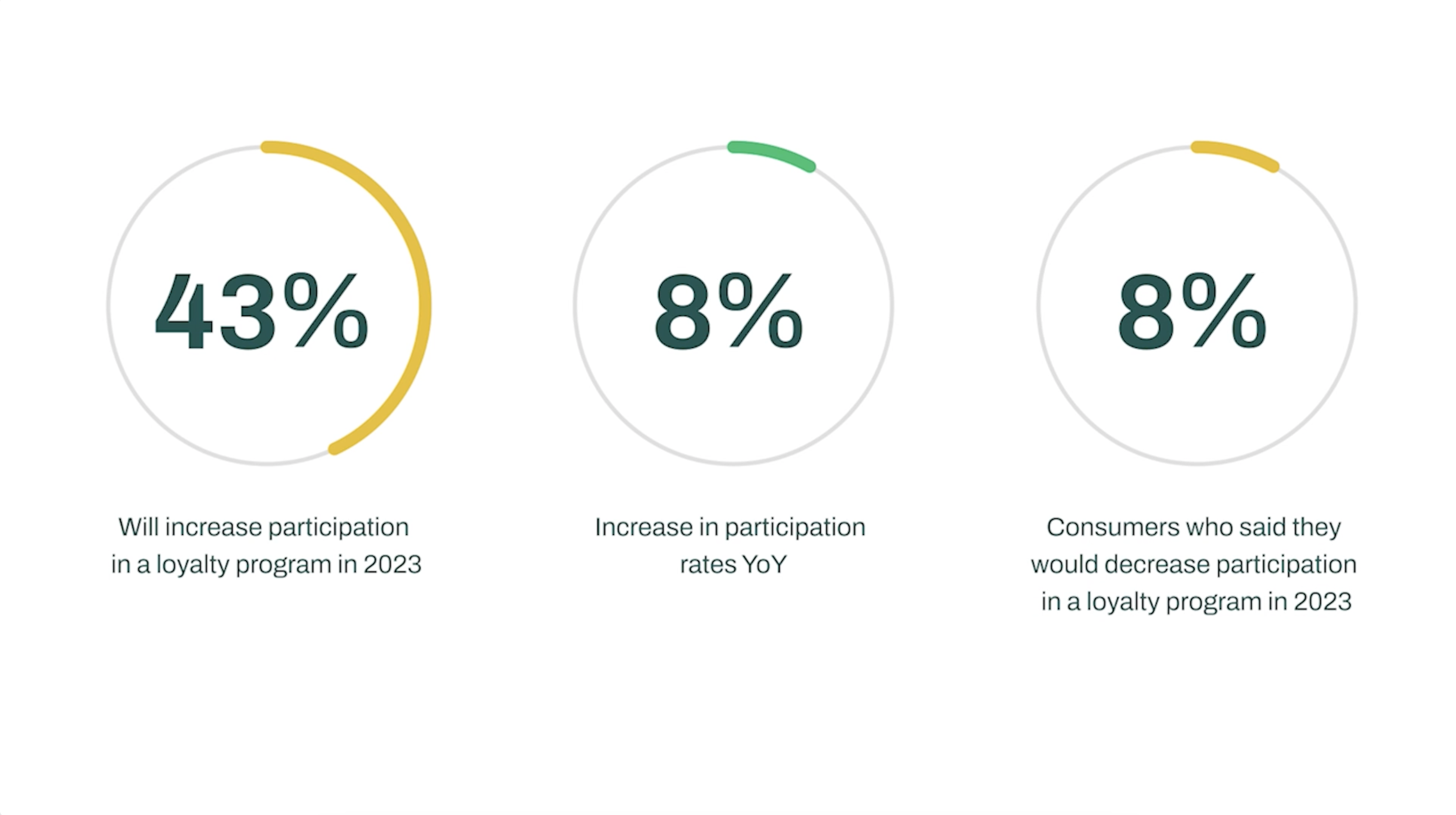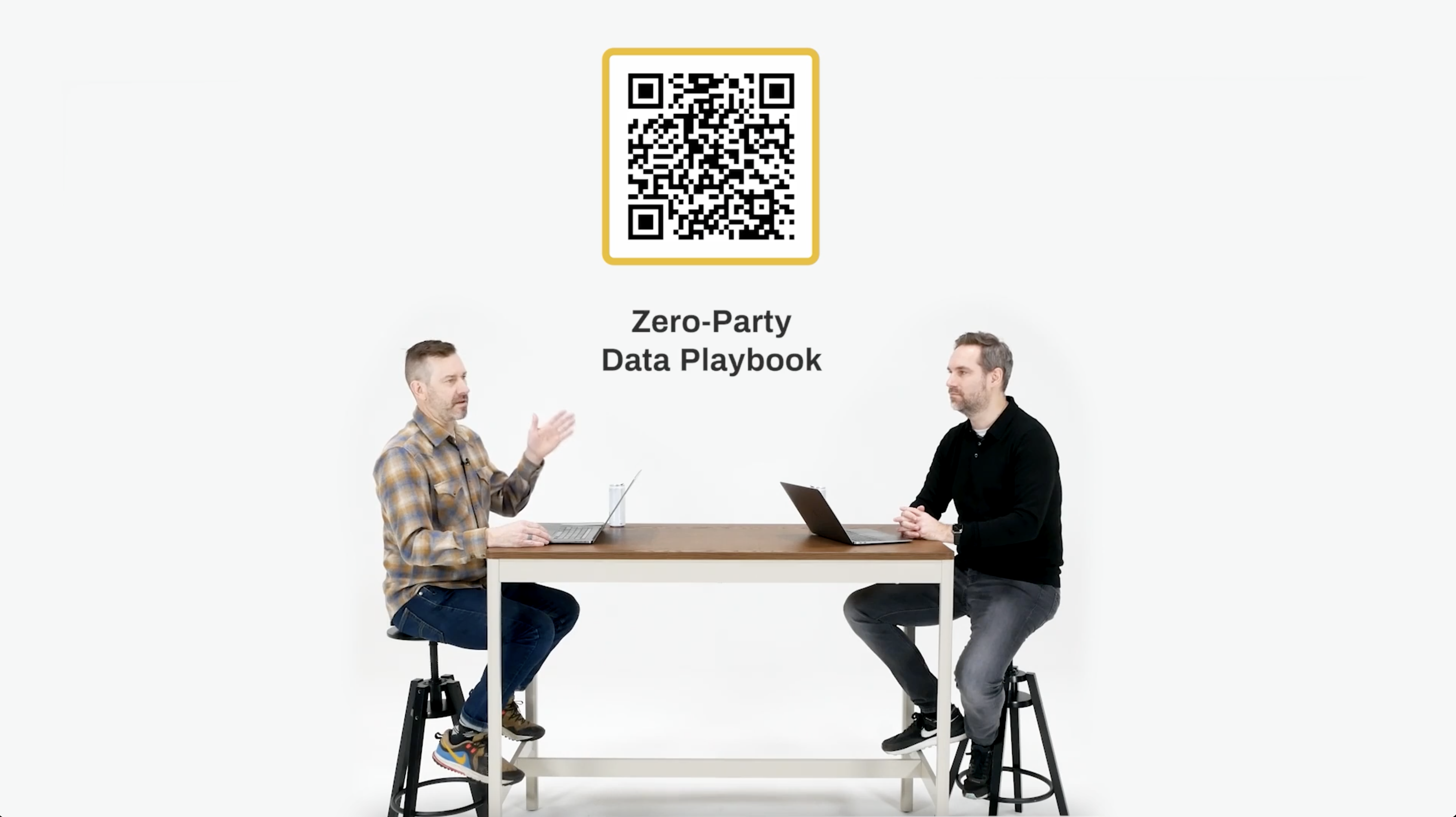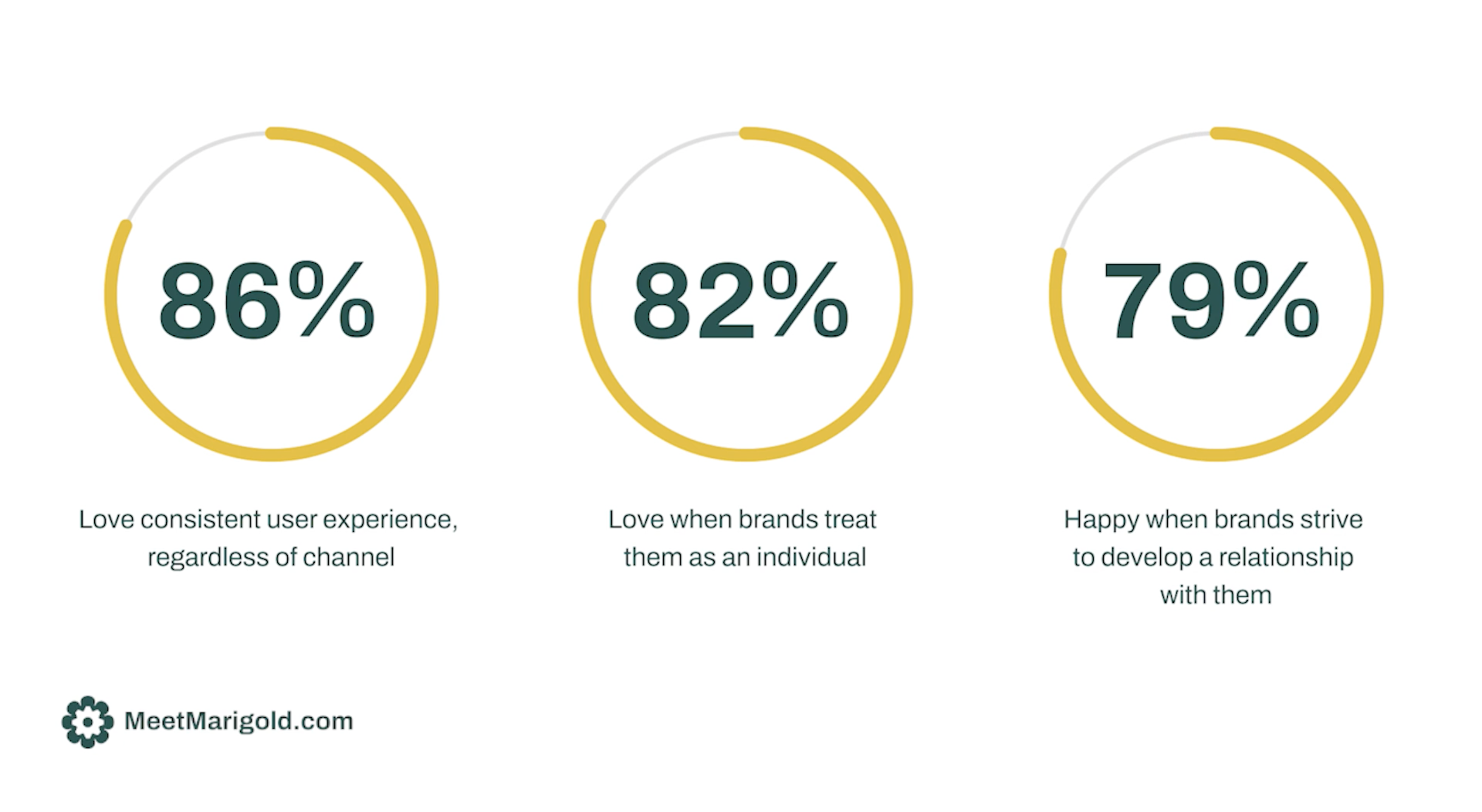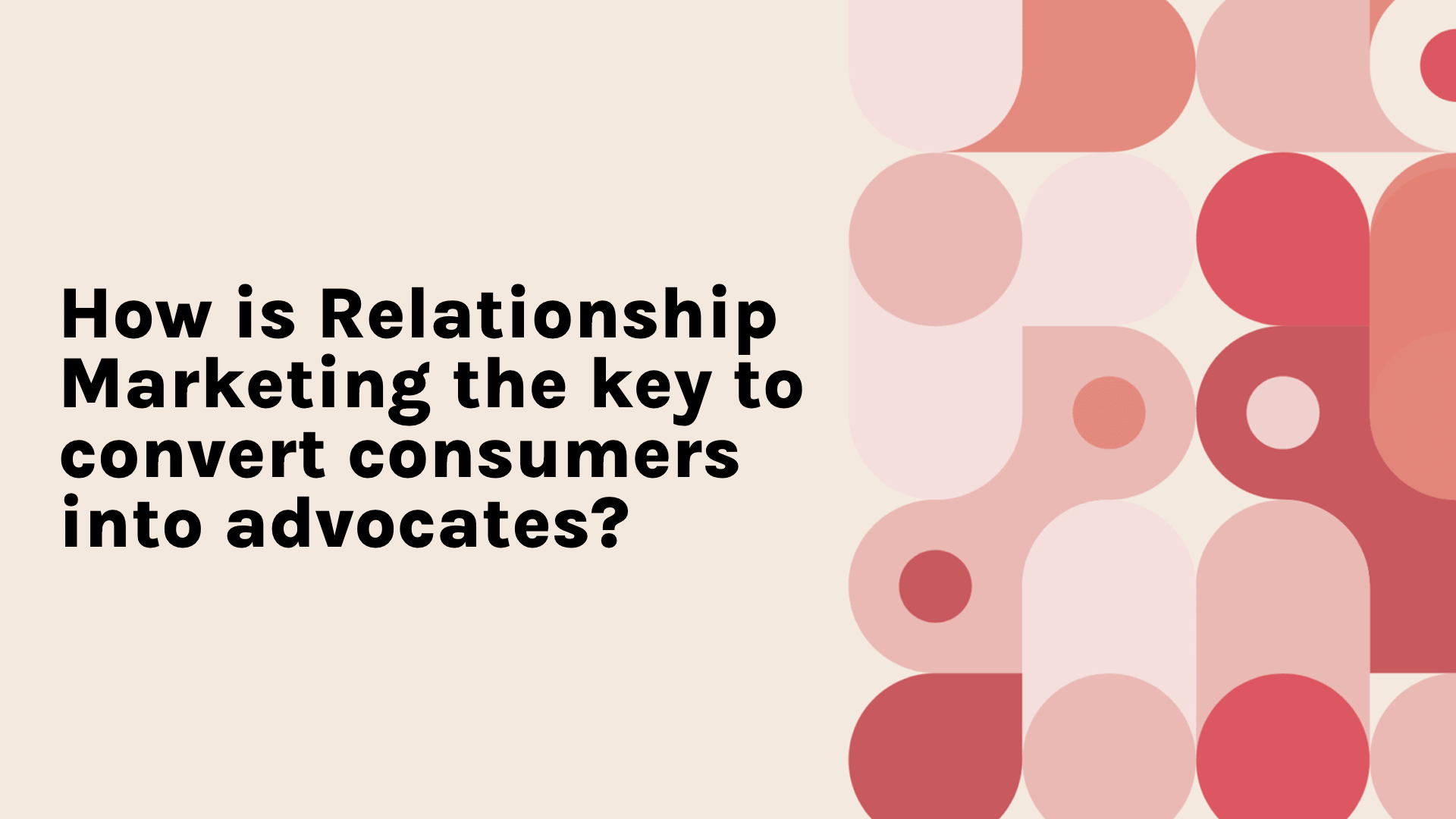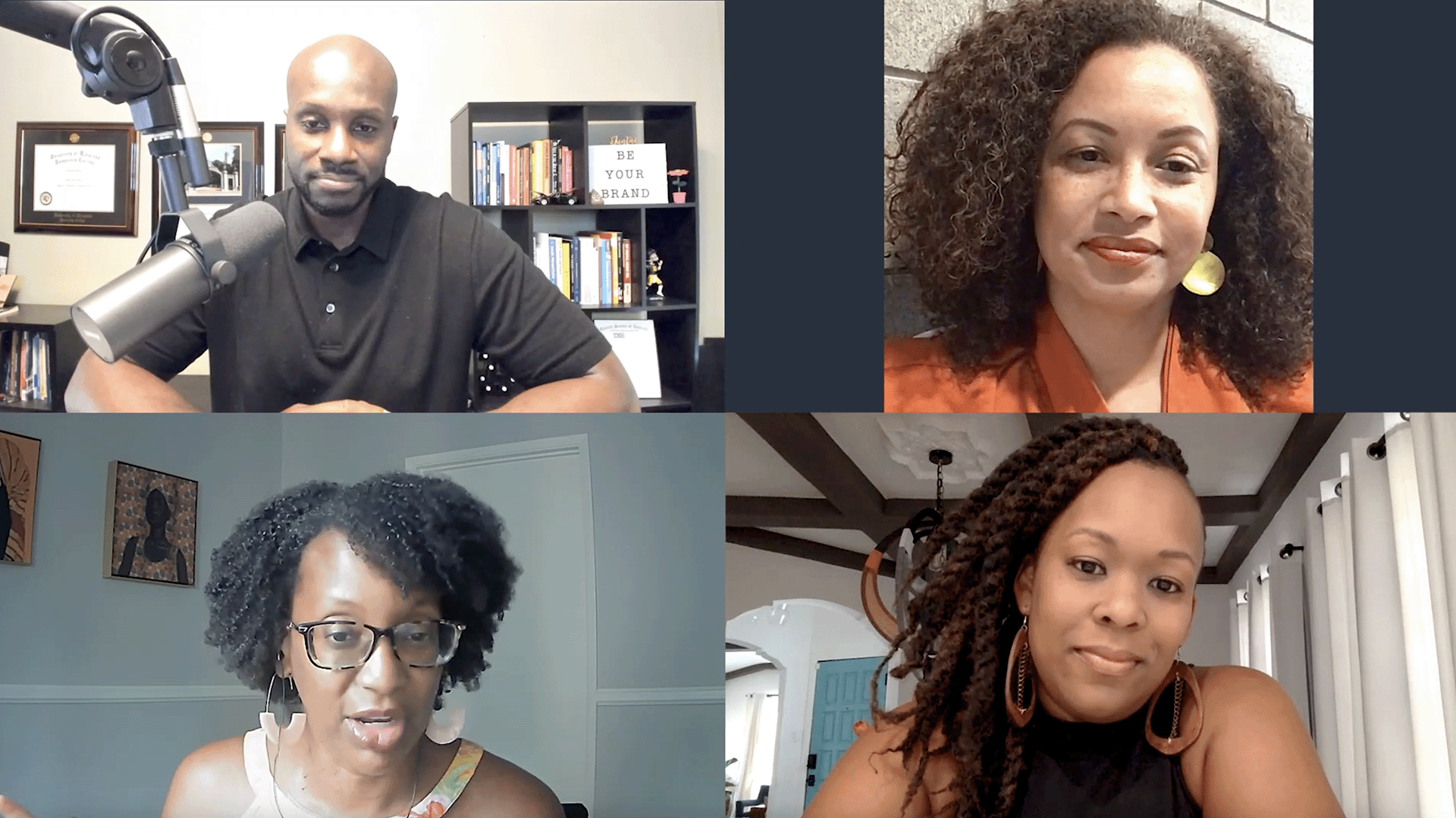Enhancing Digital Fan Engagement — Sports & Media Marketers for the Win
- 0.5
- 1
- 1.25
- 1.5
- 1.75
- 2
Kayla Siegmeier: From the remote desks of Cheetah Digital, welcome to the Sports and Media Panel where our guests today will be discussing the subject of enhancing digital fan engagement. I'm Kayla Siegmeier.
Julian: That's right, Kayla. We've really got some huge match- ups to look forward to. It's Friday Night Lights. When Saturday comes, Super Sunday, Monday Night Football, all rolled up into one. Many people will inaudible Thursday, however.
Kayla Siegmeier: All right. Thanks, Julian. Let's go ahead and get into some proper uniforms. Much better. Okay, Julian, can you tell us some more about today's panel?
Julian: Okay, looking like a game with two halves, splitting the quarters by guests. I just hope our audience is ready to give 110% for the next 90 minutes. Well, it's actually 50 minutes.
Kayla Siegmeier: All right. Thank you, Julian. This first half will see two first- round draft picks in the media industry, a current Meredith star and a inaudible. Julian, run us through that second half.
Julian: Oh. After a quick half- time turnaround, we'll have our very own north London derby, with Premier League giants, Arsenal and Tottenham Hotspur takin us through their own thoughts on fan engagement.
Kayla Siegmeier: Sounds like quite the game. All right, let's go ahead and kick this off with our first guest, one of Meredith's best, Brooke Phillips. Brooke, why don't you go ahead and introduce yourself.
Brooke Philipps: My name is Brooke Phillips. I'm the director of audience retention at Meredith Corporation.
Kayla Siegmeier: Awesome, thanks, Brooke. It's time to kick this off, so let's go ahead and get you into something a little more comfortable.
Julian: Very in style. Brooke, now you're nicely animated. Could you tell us a little bit more about your team?
Brooke Philipps: My team is responsible for our email program, as well as our notification program, so browser notifications as well as Apple notifications. We've got writers, strategists and producers on our team. It's a big team, and we get a lot of work done and a lot of notifications and communications out to our users. Now, we're reaching millions and millions of people, and then we also work really closely with other members on our growth team. Our platform team who really make sure that the data is flowing back and forth between the Meredith database and or various platforms. And then, we've got a conversion team who are primarily focused on the acquisition of our email addresses that we use.
Julian: Sounds like your team plays the role of gatekeeper over there at Meredith. How do you manage what content is presented to your audience?
Brooke Philipps: We are the gatekeepers for the side if this is an ask that we really should put in front of our audience or if it's something that maybe we should look elsewhere. And when it comes to the data, we want to make sure that we're collecting the correct data, we're collecting the right data that we're going to actually be using, and that we're transferring the data from our database to our third parties, like Cheetah, the right way and the way that we're going to execute on it. So it really does have to all tie together, from collection to transfer to actual execution, and that's why we are such a cohesive team that we work so closely together.
Julian: What does online engagement look like for Meredith?
Brooke Philipps: What it means for our team and the retention team on the digital side, we have those basic metrics. We're looking at open rates, we're looking at click- through rates, we're looking at then onsite engagement, page views per visit, time on site, video use, all that good stuff, too. But one of the big metrics that my team is focused on is really that long- term engagement. I mentioned our cohesive group of people that work so closely together. Our conversion team works so hard to gather those email addresses from the various sources that we collect email addresses. So important for us to make sure that we can keep those email addresses as long as we can. Collecting them, sending out a email, and them never engaging is worthless to Meredith. We want to have people that are quality users that come in, engage with our content. But not only engage with it right away, engage with it for a long period of time. So we're looking at time periods of six months to a year, and really making sure that we can slowly but surely make that experience better and keep them on file longer, by various different levers that we can pull. We're monitoring that long- term engagement very closely so that we can keep those people that we've worked so hard to acquire.
Kayla Siegmeier: How does Meredith look to keep its fans engaged over a longer period of time and introduce them to other brands and titles?
Brooke Philipps: One thing that's really pretty unique to Meredith is we have such a large breadth of brands at our disposal. So if we see that someone might be starting to phase out on one of our brands, we can give them an offer for our other brands to try to re- engage them, keep them a member of Meredith, but take them in a different direction. So if we see someone coming in on the parents' brand and we see that their child is hitting that 18- month mark and they're starting to became unengaged, then we hit them an offer for one of our food brands or one of our home brands, to try to take them in a little bit of a different direction but keep them engaged with Meredith overall. Keep them coming to one of our area sites that we have. But that's a big goal for us, is to cross- pollinate or to expand our memberships per brand. So we want to have, ideally, it would be our goal to have you be part of not only one of Meredith's properties but in multiple. So within our messages, within our newsletters, within our programs, within our Cheetah experiences, we're not only collecting opt- ins from a single brand, but we're collecting opt- ins and bringing promotions to light from our various properties. For example, within our, let's say, our GLOW newsletters, which is one beauty- focused that's across brand newsletter. We're driving people to about four or five different sites at Meredith. So once they're collected onto that list, we're then promoting them to InStyle or Hello Giggles or to Shape, and then potentially getting hooked onto one of those other brands' newsletters.
Julian: Oh, my favorite topic, what type of Cheetah experiences have you started exploring, then? Quizzes? Sweepstakes?
Brooke Philipps: Yeah, quizzes, photo contests, we're starting to dive into that, polls, various things like that that we're using the experiences for.
Kayla Siegmeier: If you're seeing their engagement trending down, when is the perfect time to start asking them to cross- pollinate?
Brooke Philipps: There's always re- engagement programs, and some brands we have them, and some ways we don't. Honestly, we don't feel, at that point, right before we start to filter them off or scrub our list, I think it's too late at that point. So really, we want to try to cross- pollinate almost as early as we can and that's been our mentality is, really focus on those more engaged users. If we do have someone who is going to lapse, they're probably going to lapse, right? If we have someone who is engaged and has been engaged, that's the most optimal time to get them to then convert to something that we are pushing towards them. If they are viewing us as a trusted brand that they're already engaging with, they might trust that promotion a little bit more to then engage with one of our other brands, versus someone who's lax and not as likely to take one of our promotions. So our targeted selections to get people to cross- pollinate is more so focused on the highly- engaged people, because then, we can ultimately just keep those highly- engaged people engaged longer.
Kayla Siegmeier: As a media company, you guys have a really unique opportunity where you can capture so much data. You have all these different angles you're coming off of. What's been your focus in trying to build that database up?
Brooke Philipps: I think there's a really fine line with data collection. And specifically for our team and what we're focused on, it's trying to understand that balance. We want to make that the barrier to entry as low as possible. So I think you have to be really mindful with how much data we are meeting and wanting to collect upfront. And if that is going to put people off, is there an opportunity to do progressive profiling and try to get that information later on? Once you've built up a little bit of trust, let's then see what information you're willing to give us that we can then make your experience a little bit better. What we're focused on, on the growth team, is really those data points that are going to make a user's experience better and feel more personal to them. We don't need to collect a bunch of data that we're not going to be using. So, I think it's really important to say, " Okay, if it's a must piece of data that we need to collect at the conversion stage, that needs to be really important data that we need to use to either execute our program, or it really doesn't make sense to not collect that. For example, on our parents website, all of our messaging for parents is broken out by the age, or are you pregnant or you're trying to conceive? Do have a one- year- old, a three year old?" So we need that information upfront to be able to make our messages relevant to the user. So that's a piece that we feel is pretty important that we need to collect upfront rather than after the fact. Obviously, we're really focused on behavioral data, so data that's at a user level, what are you doing? Are you opening? Are you clicking? What are the actions that you're doing on site? What information that's going to put you into different buckets of power- user, core user, which is all behind the scenes, and that's information that we just use to make the experience better.
Julian: It's always interesting hey what's going on behind the scenes, could you elaborate a little more?
Brooke Philipps: It's an interesting project that we're doing again to cross- pollinate and to make the experience better and longer for people is, we're calling it our tagging project. We're using cheetah tagging campaign and URL- level tagging, and we're starting to slowly build up a little mini- database of behavioral tags on various topics. As we do it, we're learning the degree of detail we need to have in our keywords or our tags. We don't want to go too broad, but we don't go too narrow, where then our segments are super small. But we're starting to build up these various keywords that now we can create different segments on and do different targeting or different messages or different promotions, with dynamic blocks. An example with the new pet site, we, over the last, probably, four or five months, have been tagging campaigns or links within our other brands' newsletters that is relevant to pet information. So a lot of our home brands, like Better Homes and Gardens and Martha Stewart, do a lot of pet content on their sites. So anytime anybody's clicking on those, they're getting pets added to their profile within cheetah. So now what we're doing now with Daily Paws now rolled out as a new site, we're starting to create these segments to now put in promotions within our newsletters for those people who have previously been engaged with pet content on our other brands, promotions to sign up and check out our new pet site. We're also doing dedicated messages to say, " Hey, come check out our new pet site. Opt-in to our newsletters and engage over here as well, because we know in the past that you've liked some pet content from one of our other brands."
Julian: Can you talk to us about how you digitally support the relationships you have with your affiliates of Meredith, which is obviously a very important part of the business.
Brooke Philipps: We have a lot of affiliate content and a big affiliate program at Meredith where a lot of our content and on site is linking to various affiliates, and that's a big part of what we do from email is offer different types of products that have the stamp of approval from our brands. Our editors are saying we like this product enough to write about it, or we think that this product is good enough that you should go check it out. So yeah, that might be another opportunity to put in front of someone, instead of that cross- brand, instead of that additional newsletter signup. Again, we're just trying to get some engagement out of them, rather than always focus on one single goal of either cross- pollination or more newsletters, we are able to surface a wide variety of different promotions to people. And I think that all adds up to that long- term engagement goal. We we want to try a bunch of different things that might work and might hook for somebody, and that might then make them stay with our brand a little bit longer, or our company a little bit longer. Not only with affiliates, we're in the advertising business, so making sure that experience is good not only for the advertisers on our site, but for the users who are visiting the site. So there is that fine balance there as well.
Kayla Siegmeier: I'd just love to get your take on that trust piece and where, if you have something very important to say, what channel should you be pushing that out.
Brooke Philipps: I think it's important for brands to have their messaging consistent throughout all their channels, really. During the Black Lives Matter movement, that was a big moment for brands to make a stance and surface what they felt was appropriate for their brand. And certainly, Meredith brands partook in that, and we tried to surface that, not only on social, but the way that we're writing content on our sites, and the way that we're talking about issues. And I think that this translates into every single channel. I will say that email's a little bit easier and that we send our message out and people can unsubscribe-
Julian: The purity of an email unsubscribe is actually a beautiful thing-
Brooke Philipps: ...like social and SEO or having to compete with the algorithms, and that's another beauty about email and notifications is, ours is a direct one- to- one line directly to our users, where we have 100% control of what they're getting, and we're in a really private space, their inbox. Outlets like social and SEO are really heavily dependent on those other third- party algorithms.
Kayla Siegmeier: This has been great. Thanks so much for dropping by Brooke. We really appreciate you taking the time to share a bit of your knowledge with our guests. Looking forward to seeing some more great work come out of the Meredith team. Julian, who's our next media expert that our cheetah studio has drawn up for us?
Brooke Philipps: Firstly, inaudible Kayla. Thank you again, Brooke. And indeed actually at the moment where I do wish we were all here in person, as you and our next guest would have had a great time chatting about all things media, post- panel in the cheetah green room, which is actually a great curtain room last year, but let's not worry about that. Now though, it's time to reintroduce a Signal's veteran, Maria Noel Reyes. Maria, can you say a big old hello?
Maria Noel Reyes: Of course. So, my name is Maria, and I've been working in media as the digital marketing director for the last seven years, most recently at Bauer Media. I left because I was following my innovative heart, and I started my own company, looking at smart speakers and how brands can take advantage of smart speaker and engaging with users in a voice- first manner.
Kayla Siegmeier: It's great to have you with us again, Maria. Now, if you don't mind, let's have you join us in our 2D world. Today, we are going to pick your media brain on a number of topics. To start us off, how have you seen brands cope with the pandemic, and has it changed the relationship much between digital and print?
Maria Noel Reyes: The pandemic hasn't changed anything, if anything, has accelerated that gap between digital and print, or digital and retail or your physical proposition. We are seeing through the pandemic, the companies, and the media companies and the brands that already had a strong proposition there, where print and digital complement each other, and the ones that didn't, and the outcomes of that. I think is more important than ever to be able to have that, you need to use digital to capture data and understand where the user comes from and what interests are, so then you can relate it to something. I mean, Bauer was very lucky, because we had fashion magazines. So we knew that someone came for fashion news, then the likelihood is that we'll have a fashion magazine. I can use that as a hook to be able to sell you print. If you just have an email address with someone saying, " You came to my website," then how you're going to drive that marketing message that says, " And the reason why you want to buy this in print is because we have great news content, independent news content, or we have great celebrity gossip, or we have great fashion, the latest fashion advice. You need to understand why they're coming to your website, especially if you have a broad spectrum of topics.
Julian: Maria, drawing from your experience at Bauer, what type of content should be created by media brands right now?
Maria Noel Reyes: For me, in the media world, the things that are most importantly is, people are more than ever in need of lighthearted content. They are tired of the doom and gloom. We're all listening to the news, is constantly reminder of how awful it is, what we're all experiencing. People are desperate to find an outlet, to find somewhere where they can just go, " Yes, 10 questions to see which Harry Potter house I'm part of." You just need that little bit of an outlet that makes you forget everything that's going on around you. I think media companies, especially the ones I've been working for in the past, have always had very strong streams around lighthearted content. ... I just signed up to something that's called a color contest and each of these take a picture of something that bring you joy that is colorful in your house. You use a hashtag and you might be able to win something. Oh, that's so nice. I actually have this little piece of my house I really like, because it's yellow and it's blue and he makes me happy. It's just fun. The other arm that I think is really, really important for media companies is around... They have a responsibility to stop the spread of fake news. I think media companies, they're trusted, they are brands that people look for. And I think fake news has been huge through this pandemic. So I think media companies have a responsibility now, and more than ever, to make sure that they are first, helping stop the fake news, but also providing the truth.
Kayla Siegmeier: Similar question to what we asked Brooke, what's the most trustworthy channel that media brands should be embracing during these times?
Maria Noel Reyes: To be honest, even though social media has always been a very big part in terms of the traffic that media companies get for their content, I think one of the channels that you can say has a resurrection through the pandemic is actually email, because how do you stop this spread of fake news? Well, that someone has given you their email address because they trust your brand, because they want to hear from you. So, if you as a media company has the resource, have the responsibility to just share the facts, the real facts, then yes, great, do it on social media. But if you have an email address, do it over email and people will trust what you're sending them over email, probably more than if they read it, because someone share it on social media. So I think email and knowing your audience through zero party data has become key. Brands that had a very strong, yes, we need data, we need to understand our users, this is our CRM, then they are in a much better position to be able to email their users.
Julian: Those who might not be in as strong a position, how do media brands build up their data profiles? How do they turn unknown visitors into known ones?
Maria Noel Reyes: It's interesting. One of the reason I love working with media companies is that there is no struggle in terms of creating content. When you talk about a content strategy, media companies have the sky's the limit. So the fact that you have that opportunity to harness it. At Bauer Media we used to do a lot, finding that real value exchange. Someone is not going to give you their email address just because they coming to your website and they like your horoscope. But if you are posting something like a quiz or you're helping them to vote, because suddenly your events are not physical events anymore, now they're virtual events, and then you want the public to vote for their favorite artist, or their favorite joke, or whatever it is, is very simple that using Cheetah experiences, at the end of that piece of content, just quickly ask, " Hey, before you go, would you like us to let you know when we have another voting event or would you like us to let you know when we have the next Harry Potter quiz available?" Within that, you can even ask a little bit more, is like, " Well, clearly you like your Harry Potter quiz, would you also like to let you know when there is any other super fun quizzes?"
Kayla Siegmeier: When a brand is starting off down this journey of repositioning their strategy to focus more on the zero first party data, where should they start?
Maria Noel Reyes: So, in my experience, when we did it in the past, is about do it slowly. So, if you get someone to engage with your content, because you have a very strong content strategy, once they've done 10 questions, or they have interacted with your social wall or whatever is that experience, that value exchange that you created for them, don't just ask them, out of about 20 questions, more about their persona, because they're just going to go, " No, I'm not interested." So you need to be a bit slowly, just ask for an email address, and maybe one question, just a little bit about themselves, and then use that to keep building it. Then that person is going to come back, and then they're going to give you their consent for you to talk to them. Then the next time, if you have a strong CRM plan in place, then you will send them into a welcome journey, where it said, " Hi, thank you very much for joining us. We know that you like this brand, would you like to hear more from this other...," and then just take them through this welcome journey to CRM and email marketing that will give you more information down the line about that person. I'm definitely say don't overwhelm them to begin with. It requires trust and data is a very precious thing, so just slowly is better.
Kayla Siegmeier: Google, this past year, announced that they're pulling third party cookies. So even if brands previously weren't thinking about zero party data, they need to. Looking at that zero, and even first- party, data as the guiding light into your strategy, how important is that going to be for media marketers in the future?
Maria Noel Reyes: Is huge. Because is not just about digital, but is about media companies have this, needs to keep this balance between digital and print. For the survival of print, you so need that data that comes from digital, so then you can sell subscriptions, you can sell one- off runs. Now is the time to try as hard as you can to just build that database, build that zero party data and understand what your users are consuming online. Becomes if someone comes to the Grazia website because they like hearing about the latest fashion news and I'm trying to sell them practical fish keeping magazine or subscription, it doesn't work, it's not going to happen. So you really need to harvest... I have Maria, she gave me her email address, and she comes from Grazia, and therefore I have 90% more chances to sell her a subscription to the Grazia magazine. Is now the time to use that data to be able to close the gap between digital and print. And is about building the super fans. So once you have taken them through that journey, once you know that they're comfortable, you can even ask for referrals, once you have these super fans. I think someone recommending your brand is much more powerful than you trying to cull your acquisition strategy from cold call messages or pop ups in different websites or an NPU-
Kayla Siegmeier: We had Seth Godin, he talked just about that. How do you take that viable audience and build them up to what you said super fans.
Maria Noel Reyes: Yeah. And I think you need to do it slowly with the data that you have and with a good, strong CRM strategy.
Julian: So Maria, to finish, why not tell us a little bit about your current project, the company setup, and how media brands listening to this may find something new and interesting in this area, too.
Maria Noel Reyes: While I was at Bauer, I was working on a project with smart speakers. So how do we take brands that don't naturally fit within the voice environment? And when I say smart speaking, I'm talking about Alexa and Google Home. So how do you take brands, media brands, that might not naturally fit because they're not radio stations, but could still take advantage of the fact that one in three homes in the US have a smart speaker, and one in four homes in the UK have a smart speaker. You have a call to action on a cereal box and you can just say, " Hey, Alexa, let me enter into the giveaway." Media brands, is all about content. Is so simple. So you have quizzes on your website, you should have them on a smart speaker. You have your horoscopes on your website, you should have them on a smart speaker. Is a channel. I think that in two to five years time, users will expect brands to have a voice app, as much as they expect them to have a website or a Facebook page.
Kayla Siegmeier: All right, thank you so much, Maria. We wish you all the best with your new adventures, and it has been a pleasure to have you join us again this year.
Maria Noel Reyes: I thank you so much for having me. I just love, by being part of your Signals. I was there last year, I'm here these year. I love what you guys do and I really, really appreciate you inviting me along.
Julian: So that's halftime. Quick everyone, grab an orange, or a Gatorade, other sports drinks are available, and join us a matter of mere seconds for part two of our sports and media panel, the sports section.
Kayla Siegmeier: I've never heard of halftime oranges, but it's nice to see you're getting into character.
Julian: What do you mean? Oh, I'm a ball. So it matches my big, round inaudible I guess.
Kayla Siegmeier: It suits you, though. All right, folks, let's get the 100% unofficial North London Derby kicked off. Julian, who's first down the tunnel and out onto the pitch?
Julian: Kicking us off, the current holders of the world's oldest football competition, that's the FA Cup, for Arsenal FC, Adam, please go ahead and introduce yourself.
Adam Rutzler: I'm Adam Rutzler. I am the senior campaign and insight manager at Arsenal Football Club. I've actually been in the club for 11 years now, so I'm due a testimonial actually.
Julian: I'll be more than happy to appear in your testimonial as well, Adam. A bit violent on the pitch, but it'll will bring in the crowd. Could you tell us a little bit more about your group.
Adam Rutzler: There's seven of us in the campaign insight team, and we operate a little bit like a internal consultancy, if you like. Got half of the team focused on that real data- driven decision- making, so ensuring that, as a club, we are led by data and that we make our most informed decisions when we can. And the other half of the team are all about that campaign construction and planning. It feels logical and a nice fit that the to sit together, because obviously, you need the right hand talking to the left in terms of that data really driving that campaign planning.
Julian: Adam, with the fans in mind, why= is digital engagement so important to Premier League clubs like Arsenal?
Adam Rutzler: Before I even get into that, if there was one thing, Julian, that Arsenal Football Club has been saying since the COVID struck, and that we were having to play games behind closed doors, is how much football needs its fans. It really loses so much when the fans aren't there. At Arsenal, we are lucky enough to have a huge global following. Depending on what research you listen to, our global following is estimated to be over 750 million worldwide, which is a phenomenal of amount of people that are so passionate about our club and our brand. And digital channels and digital engagement is so important to help us as a football club, and as a brand, to connect with that global following. What we are out to try and achieve is to build deep, long- lasting, meaningful relationships with our fans. It's really important that we build that engagement, we utilize the digital channels we have to make the fans feel connected with the club. If they feel connected, that love grows, the passion grows, that creates a foundation for us to build successful commercial partnerships, and some fans won't like to hear that all this relates back to revenue and partnerships and commercials. But actually, what partners are looking for are looking for a club with an engaged fan base. That's what we're lucky enough to have, therefore we can be successful with our commercial partners, and that allows revenue to come into the club that we can invest into the team and onto the pitch to drive towards what the fans really want, and that's Arsenal Football Club competing at the top end of European football.
Kayla Siegmeier: What are Arsenal looking to do in order to increase all this fan engagement?
Adam Rutzler: Yeah, good question, Kayla. Not the easiest one to answer, but I think it stems back to innovative content. We need to make sure that the content that we're producing as a football club really resonates with the fans. And we are always pushing the dial on creating new, innovative, well thought- out, exciting content.
Julian: Unlike a lot of other industries that we deal with, you have inbuilt the interest and the content.
Adam Rutzler: The bit that we get involved in the most is around how we ensure relevance of our content to our fan base. So we do that by really trying to understand our fans to a fine degree and understand their behaviors and how they interact with particular types of content. And then, layering on top of that, we build out omnichannel campaign strategies through lots of various technology that we use, key to digital being actually the main platform that we use to ensure that the communications that we have are relevant to our fans and are communicated out through the right platforms at the right times, through the right channels, in the right tone. Which is really, really important, because we want to make sure that that message, that campaign, that brand message that we're trying to deliver is consistent across all of those different touch points. So, it needs to be relevant for the fans, we need to understand who they are and what they want from the club, we need to understand how they engage and if this type of campaign that we have is relevant for them, and we need to understand what channels and what platforms we would be most effective to reach our fan base. I think it's a combination of those. We could talk about the content all day long, because that's perhaps the most shiny element of the mix. But I think the data and the understanding the fan, and then the campaign strategy and the channel execution is the bit which really makes the difference.
Julian: Unlike a lot of other industries that we deal with, you have inbuilt the interest and the content.
Adam Rutzler: And to be honest with you, in my role across campaign and insights, that's the heart of what we're trying to achieve, Julian, and it's been a challenge. And the challenge was, three, four years ago, was that the club was thinking in those different silos, so the ticketing thing we're thinking about there, ticketing buyers, the retail team we're thinking about people who bought kits, the hospitality team, we're thinking about people who bought hospitality. And they were all talking in their own terms, in their own transactional- led manner about understanding our fans. So the approach that we took to address that challenge was we wanted one unified way of understanding our fan base that could sit across all of those pillars. It was a huge piece of work that we led and delivered to the business about two, three years ago. Initially, we delivered a UK fan segmentation model. So we worked with a external provider called, Experian. They appended lots of external data to our UK fan base, and then we went through big clustering analysis and we pulled apart, using demographics, using transactions, using lots of additional data that Experian overlaid onto our UK base. We pulled it apart, through the clusters, of seven distinct groups. That led us to a persona... where we could really put color onto those personas. We could name them, we could illustrate them around the business. We held workshops, we got staff members engaged. We, right from the top to the bottom of the organization, we ensured that these personas, with vernacular that staff used in planning meetings, in thinking about how the Arsenal fans exist beyond the four walls of Highbury House, just outside of the Emirates. And that was a really big shift in thinking, to be honest with you. And that created me being able to walk into a meeting and us talk about affluent families and high- flying professionals, rather than kit buyers and ticket buyers. And it really just takes you to the next level of understanding who our fans actually are. Where do they live? What income levels do they have? What are they interested in? Where do they shop? Then, on top of that, our Arsenal transactional- level elements, and how do they engage with the football club?
Kayla Siegmeier: That sounds like a really interesting approach. Adam, have you looked to broaden this internationally?
Adam Rutzler: That was the starting point, the UK model. Then, very quickly, we were being challenged internally, what about our huge global following that you're talking about? And so, within the last 12 months, we've launched an international fan segmentation, adding 200 countries worldwide that we have data on. And we now have personas for each of those six international fan groups, which has, again, made sure that when we're talking to potential partners, when we're talking to the media team about what content we should be creating, when we're talking to the retail team about how we're going to position the next kit launch or the products that might be selling well in particular markets, we are using this umbrella segmentation, persona- led approach to really allow those areas to understand who our global audience is.
Julian: That is a digital transformation project that I've ever heard one.
Adam Rutzler: Actually, we work with a magic triangle, the power of three, the transactional data that we have in our CRM database is key, the demographic segmentation persona- led approach that I was just talking about, on the right- hand side, and then, the behavioral data on the left- hand side. And really, where we get to really understanding our fans is when we take a combination of all three of those and we hit the sweet spot in the middle, what are they buying, who are they, and how do they engage in the football club? You bring all of those together, you have the technology, the data, the infrastructure, to be able to bring all of those together, and that's when we really get to the power of understanding the fans, what they want from the football club, and how to get that to them.
Julian: A fan is a person. A fan has their own interests and their own desires, and they're made up of those information that forms the triangle you described. But until you take the very simple step of trying to understand the person as a person, then you can't do all the other work-
Adam Rutzler: On your final point, I think, Julian, around how should organizations within sport look to try and create this more rounded view of their fans, of their followers, of their supporters. I think the one thing that really gave us that step change was going away from thinking about it within these silos, to what you are saying there around actually that unified understanding across the top. So who is the fan, regardless of if they buy a ticket, if they buy a membership, if they buy a shirt, who is the fan? What life stage are they at? What else is going on in their life? What do they want from the football club? And if you get that message from top to bottom throughout your organization, all of the subsequent conversations become easier, because they're all from the same starting point. Whereas, if they're from different starting points, you get lost down blind alleys quite quickly.
Kayla Siegmeier: All this amazing stuff, what are you guys going to be doing next in the engagement space?
Adam Rutzler: Lots of great stuff, I think is the answer there, Kayla. But from my perspective, I think the really exciting thing that the insights been working on at the moment, to continue on the trend of understanding our global following, is probably to make the triangle into a square, and add psychographic data into that. We really want to understand the fans, attitudes, values, personalities, aspirations, and what all of that means to the football club, in terms of what motivates them to take the actions they do. What motivates them to engage with a certain email or a certain post on social, or a certain piece of video content? And if we understood the personality of a fan, the aspirations of a fan, the attitudes that they have, through some very intelligent survey questions and intelligent progressive profilings, and all sorts of techniques, could we map that to certain psychographic profiles that enable us to then say, moving forward, we have objective X, Y, or Z, or content A, B and C, what type of fan is motivated, would be motivated to engage with this and why? And that data would really give us an insight into that. There's some big work going on in that space which I'm particularly excited about.
Julian: I always like chuck into experiences whenever I can.
Adam Rutzler: Actually, you're quite right there, Julian. We've done some brilliant work already with commercial partners. They may be doing competitions, ticket giveaways, whatever it may be, signed shirts, and we've been able to progressively add strategic questions that are relevant to the experience, that have an underlying tone of, we're trying to find out X Y, or Z, that will help us with campaigns we have down the line. The result of that is sustainability is key for us at the moment. As a football club, we take it very seriously, and a lot of our partners take it very seriously. We're trying to add breadth to our knowledge of our fans about their thoughts and feelings about that. If we understand that, not only does that work well for us and our partners, we can actually talk to the right fans that care about sustainability and all the efforts, the club and the partners that are active in that space. I feel as though it's win, win, win around if you have your data strategy right, Cheetah experiences is at the very heart of that, the heart of the planning that we're currently going through.
Julian: I feel we're getting to the point where we're getting better at feeling confident brands this is, talking to people. And clearly, you guys have put a lot of effort to make sure that you're asking the right things at the right time, in the right way.
Adam Rutzler: You could go further than that and be quite explicit up at the front as to this information helps us be more relevant to you, it helps our commercial partners, that drives revenue into the organization. You don't have to be that explicit on every experience, but at the right time, telling that story to the fan base, I think they appreciate the upfront honesty, and that really aligns to our values. And making sure that we're not trying to pull the wool over anyone's eyes across our global following is really, really important and the reasons why that that information is critical to the football club and how it needs to operate moving forward.
Kayla Siegmeier: All right. Thank you you so much, Adam. This has been absolutely fantastic content, and we really appreciate you taking the time to chat with us. But now, we are headed off to your noisy neighbors next door to see what they have to say.
Julian: To dare is to do. And our next guest certainly dared himself to make an appearance on this panel. That's right, representing Tottenham Hotspur, Matt, please announce yourself as our latest signing.
Matt H-Lamb: Hi, I'm Matt Hudspeth- Lamb. I work as a Senior CRM executive at Tottenham Hotspur, and I've been here for two and a half years now. I'm responsible for planning, executing digital campaigns in order to reach, acquire and grow the Spurs' database, and... generally across the world. I'm part of the CRM team at Spurs, so we're responsible for a lot of things, wealth of things, memberships, supporters clubs, database, email marketing, as well as youth marketing, too. So we cover a lot of bases.
Kayla Siegmeier: So similar to Adam over at Arsenal, does your team act like an internal consultancy?
Matt H-Lamb: Yeah, I'd love to see so, especially in the partnership team. They've got a lot of relationships outside of the club, but they want to come to us for activation ideas and how we can get involved. And I think with digital experiences, and that's a piece that we're getting more involved in, so that's been great. That's the great thing with the CRM team, we touch different bases, finance, hospitality, for example, the general marketing areas, global football development, the women's side. Yeah, there's lots of areas and opportunities to get involved. Things are changing so often, especially in the times we're in now as well. I think it's only accelerated digital experiences and the relationship we have with fans.
Julian: Why is digital engagement so important to Premier League clubs like Tottenham?
Matt H-Lamb: Yeah. I think it's built three different strands, but ultimately, it's about engaging your existing fan base, for one, especially in the times that we're in now and behind closed doors, you want to keep people informed as to what's going on with the club, as well it's a great opportunities to attract new fans. There's people out there that are perhaps not Spurs fans, but just Premier League followers, in general. They might want to get more involved with the club. And as well, increasingly, like in marketing and fandom, I believe, people are following players more so than clubs. You saw with Cristiano Ronaldo, he going to Jurventus from Real Madrid, the amount of followers that Jurventus gained after his transfer, for example. We've seen it at Spurs, too. Gareth Bale recently, and Alex Morgan signing. That coupled with Heung- min Son already been at the club, then it got enormous followers across the globe, and especially with Sony in South Korea, Gareth Bale globally, too, Alex Morgan in America. So, it provides a great opportunity for the clubs.
Julian: What announcements being made? What are the things that you're looking at?
Matt H-Lamb: There's lots of different areas across the club that we're monitoring how a signing impacts the club. For example, social media, they're looking at number of social media followers to increase. For example, with the women's side, they have two separate accounts, the women's, and then you got the men's. So the Alex Morgan area, looking at how many followers increase you have on the women's side as well as the men's. That's one. The European database, growth. You're looking at email engagement for example, engagement with social media tweets, and ultimately, we're looking at retail, how many shirts are being sold, for example, personalization. It hits every single area, and it's incredible, really, after just one player signing, of the growth you can have. You be looking at website hits, for example, too, looking at spikes.
Kayla Siegmeier: What are you guys doing in order to increase fan engagement?
Matt H-Lamb: We're increasingly looking at more digital experiences so that's something obviously we've been working on with Cheetah which has been great. Like I say, it's only accelerated in the last six months or even so in the lockdown period is brought it forwards, not just in our area, but across the club, in general. A few recent examples are a Spurs inside campaign where we've gone out to fans across the world to get involved with putting them onto the screens in the bowl when we got home games. That's been great, and interacting with the players and giving them support when fans can't be in the stadium, that's been really nice. We've also highlighted Hotspur heroes, again, coupled with our partner Cadbury's, to highlight people and fans that have done some great things in the community and go beyond the realms, really, especially in the supporters club area. And also, we've seen more player interaction with supporters club, for example, and bit of surprising delight is something that we've done in the past, but we want to do more so in the future.
Kayla Siegmeier: What is that surprising delight experiences look like?
Matt H-Lamb: Well, we've got a One Hotspur membership, which is enormously popular across the club. But ultimately, as part of that, we have a rewards program called One Hotspur Moments. It's One Hotspur members, and that gives them once- in- a-lifetime opportunities to, for example, meet players, to engage with them, to do virtual Q& As, virtual stadium tours, these are all things we brought in the last six month-
Kayla Siegmeier: Partners and sponsors are so important to sports teams and associations, so when it comes to digital fan initiatives and activations, do the partners and sponsors come to you, or do you pitch the ideas to them?
Matt H-Lamb: Yeah, I think it's a bit of both, really. Love the partners and the companies, their sides come up with ideas themselves. We'll learn from our own experiences what's worked and what hasn't in the past as well. So, for example, recently like Korean Kumho Tires, a Korean partner of ours, they've just done a great initiatives with younger members and the virtual mascots. In fact, there's just been a recent award for those from that initiative that just gone out there. That's a really nice idea, activating things in their contract. From the partner sides, the partnerships team to the CRM team, we like to work together, and we can offer suggestions on what we have in our capabilities from a digital point of view and think, " Have you considered this before?"
Julian: Was it data and opt- ins related to these partner and sponsor activities? Is certain information shared?
Matt H-Lamb: I say, probably more so in the GDPR world. Sharing data with partners isn't as prominent as what it probably was before. What it would be more in the case of now is partners hosting their activations on our platform. So we have two options, we have one which is a club opt- in, and a second one which is partner opt- in, do you want to hear from our partners? And it will often be now a case of us going out on behalf of partner, saying this is what the campaign's about and this is how you can get involved.
Kayla Siegmeier: Is there a different approach to fan engagement when it comes to the women's teams compared to the men's?
Matt H-Lamb: Day signing of Alex Morgan, actually it was a really new initiative for us, and perhaps we did things with that sign we haven't done before in our men sign. For example, going out and billboards in New York. It was a real global capture. In fact, we probably learned quite a lot from that signing, implementing it into the Gareth Bale signing, and it really pulled the club together, different areas of the club and coming up with different ideas is incredible, the list of things that we had together to get through. Yeah, it was a real new initiative and something that we can learn from in the future.
Julian: With Tottenham enjoying a large and active membership base at both their local and global level, how does the club approach serving these members?
Matt H-Lamb: It's providing exclusive opportunities for those members, that we know one of the benefits of becoming a member is getting access, traditionally, to match tickets which obviously been taken away at the moment, unfortunately. But ultimately, it's about retaining that exclusivity, so providing modular experiences, making them feel part of the club despite them not being able to attend matches. That's been really important. So highlights before about giving them opportunities one-in- a- lifetime, unique opportunities to get involved and meet players, and that's something that's really, really important. When we had preseason fixtures, we did a first campaign of streaming them, and that's something we've never really done before, and that was really successful. Members and season ticket holders were able to get a free code for that.
Julian: When you're trying to build out a broader profile on someone, what are some of the interesting data points on an individual?
Matt H-Lamb: So location, country's really, really important. We want to know where a member's from, and when we know that, we perhaps know their native tongue, we know what players that they'll likely engage with. So, when we go out with a different experiences, we can tailor it to those different countries. We have enormous following in America, for example, and South Korea, given the play we have there, but also in America's, it's probably the amount of expats, so that's really, really important. Favorite players, one as well.
Julian: Do you have any favorite examples of recent experiences by Spurs that broaden the golden fan record?
Matt H-Lamb: We released the N17 mural, inaudible through experiences that's been great, us encouraging artists and just general fans to get involved and upload pictures of their portraits, for example, and some great designs, so that's been a really nice initiative. So many great designs to see on social media of people putting together murals and different pictures of players, their own art. Yeah, it's been fantastic to see the number of entries that have come in and different entries, and the different styles that people have put together has been great. I mean, it really reflects the culture of Tottenham, and if we can engage people like that, gather some new data.
Kayla Siegmeier: We spoke to Adam a little bit about this as well, but has this first CRM team started to identify different fan types and personas?
Matt H-Lamb: Increasing project in the last couple of years that I've been involved in personally is really identifying the acquisition source as to where people are coming from, so it's been really important. Members might have a very different profile to somebody who's just engaging with a club for the first time. So, members further down the line, if you want to call it that. So giving them a slightly different experience, a different message, that's really important. Supporters clubs, season ticket holders members. Yeah, a bit more advanced. But again, just with the artwork, competitions, and even shirt- signing competition, just trying to get people onto that journey for the first time, and then you can build it up gradually from there. There is quite a lot of work behind the scenes to identify first- time attendees, regular engages, for example, where people are located somewhere. It does have a matter difference as to the content that people engage with and what we put out there.
Julian: Are there any digital trends that you've seen or digital initiatives that you guys were almost forced into because you needed to do something that you think will be a longer term keeper?
Matt H-Lamb: User- generated content, that's always been out there but maybe underutilized within the sport scene and something that we've really enjoyed putting out there for fans. Again, with Sony fans being at home, it's a great opportunity to take behind the scenes and see what they're up to, again, Hotspur inside initiative live. We want to see people celebrating in their houses, and if they're celebrating Spurs' goals, Facebook uploads, video shares, that's been great. And predominantly, it's given us opportunity to go behind the scenes of the fans, not just behind the scenes of the club, so it reverses that trend, that we can see it with official supporters clubs as well, we can see what they're up to, upload their photos and their initiatives they're doing.
Julian: Tottenham, of course, you're now a destination for multisports. Do you ever do any cross- sport initiatives like, this is Tottenham talking to NFL fans?
Matt H-Lamb: Last year, we saw the NFL launch officially at the stadium, and we had a couple of games. Unfortunately, that's not been the case this year, because obviously, with everything going off with COVID. But Harry Kane, our star striker's a massive NFL fan. Saw some great content going out there last year of him doing some kicking and fans getting involved from that point of view. We also have NFL Tottenham Academy, which is great. And again, that opens the door for engaging content. While it's unfortunate we're not going to be able to host the games this year, it does open the door to doing things alternatively, and bringing that NFL experience to the club and cross channel and across the Atlantic, for example. It's a 10 year- relationship. I'm sure that we can come up with some initiatives going forwards. But last year, it was great.
Julian: Do you have a golden rule when it comes to how CRM team looks to engage with Tottenham fans?
Matt H-Lamb: From an experience for review, it's the actual family experience. If we're doing initiative, for example, on Cheetah, how easy is it to enter? On social, I think it's been very, very aware of the fan sentiment at the time. That's really, really important. How a game perhaps has been well received. I always refer to football fandom as very, very unique. It's not as if you're going out to buy a dishwasher, for example. You can go out and buy different products off the shelf. Football's very, very unique and it's about understanding how fans feel at that time. And that, very much I think, dictates what content is out there and how people are going to be engaging with that. So, that's very, very important.
Kayla Siegmeier: Matt, wonderful insights. Thank you so much for closing out what has been a brilliant panel. We wish Tottenham and Arsenal all the best, this season.
DESCRIPTION
Sports marketers are re-evaluating which content resonates best with an increasingly engaged and expectant generation of fans. It has also provided a chance to adopt smarter tactics with fan data, building out a broader view and creating a golden record.
Media marketers, considering how to tackle increasing privacy regulations and the end of 3rd party cookies, are adopting new and innovative ways to keep their fans engaged and onsite by learning who these previously unknown visitors are and what they like. Data acquisition & enrichment, the importance of building a centralized data strategy, should be at the very core.
Today's Guests

Maria Noel Reyes

Matt Hudspeth-Lamb
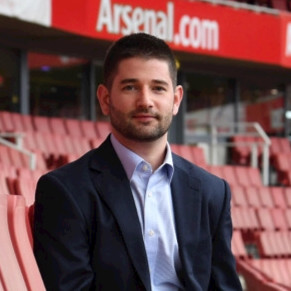
Adam Rutzler



